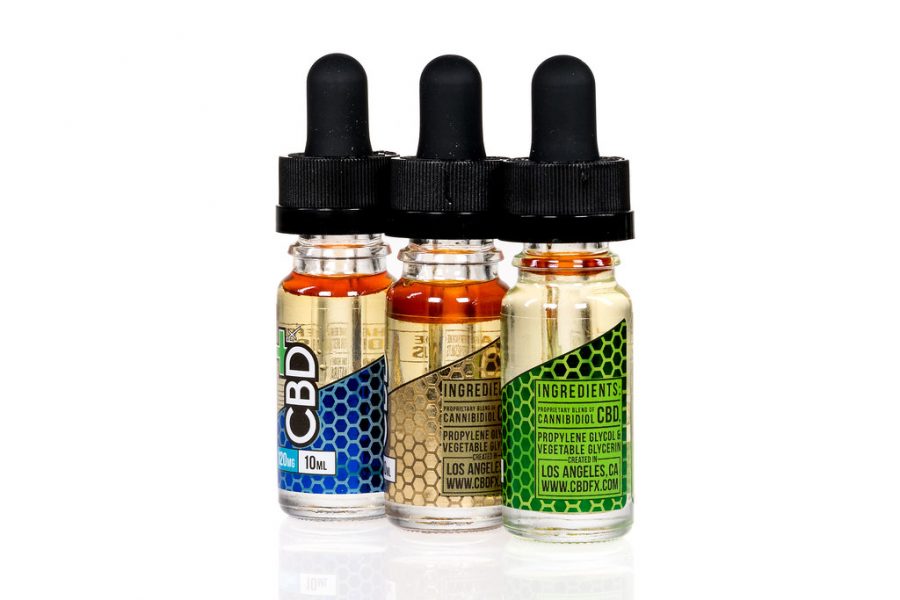Uncertainty about the Legality of CBD in Food Stirs Controversy
September 10, 2019
Everywhere you look these days — coffee shops, boutiques, malls, even CVS — you’ll see three letters that lure customers looking for something to relieve the stress of their busy day-to-day lives. These letters are CBD, which stand for cannabidiol. CBD is one of the main components of the cannabis plant, commonly known as hemp or marijuana depending on its THC content. THC is the chemical in cannabis that causes its hallucinogenic effects, and cannabis that is referred to as “hemp” contains only minimal amounts. CBD has been proven to reduce stress-induced changes in blood pressure according to a 2017 study by a group of British scientists. It also has been claimed to minimize the mood swings brought on by depression, calm the body and mind, promote a good night’s sleep, and cure muscle pain, though few scientific evidence exists to back up these claims.
CBD is touted by stores, independent companies, and salespeople as a “miracle medicine” of sorts, which is why so many customers are drawn to it — and as long as this CBD is extracted from hemp and not its dangerous cousin marijuana, it’s perfectly legal for use in a variety of products in 47 states as of the passing of the 2018 Farm Bill. Whether or not these products include foods and drinks, though, is uncertain.
Blue Sparrow Coffee in Denver, CO enlaces CBD into its coffee. Vegan fast-food chain By Chloe has a line of sweets called “Feelz” which include cookies, cinnamon rolls, and brownies all with CBD as an ingredient. Even big food companies are capitalizing on the CBD trend — in an announcement Spring 2019, Ben & Jerry’s announced, “You probably already know that we’re fans of all things groovy — think: Half Baked and Dave Matthews Band Magic Brownies. So it’s no surprise that we can’t wait to get into the latest food trend: cannabidiol, or CBD. We are open to bringing CBD-infused ice cream to your freezer as soon as it’s legalized at the federal level.”
The last line of Ben & Jerry’s announcement is the key to this controversy. Though the Farm Bill legalized CBD for medicinal use, it has not yet been approved as legal for usage in food by the FDA, causing backlash against companies that include CBD in their food. An example of such is Thrive Market, an organic/natural product website that was forced to stop selling CBD-laced products due to the transparency and vague rules surrounding the sale of CBD food.
The reason why, according to Healthline.com, is “because CBD has already been approved as a drug to treat pediatric seizures (Epidiolex in June 2018), it cannot legally be added to food or dietary substances.” The article published by Healthline also quoted Dr. Norman Sharpless, the FDA’s commissioner of food and drugs. Sharpless stated that “the law says that FDA can issue regulations to create new exceptions to these statutory provisions,” but such regulations have never been issued before. Having CBD be the premier substance to become one of these exceptions would be a risk for the FDA, especially concerning the possible unsafety of CBD and its harmful side-effects – including diarrhea, a reduced appetite, fatigue, and maybe even more that still hasn’t been discovered yet due to the lack of research on CBD.
Companies that incorporate CBD into their products have also been making shady claims about the substance that led the FDA to even have to warn some of them — one in particular being Curaleaf, a Massachusetts-based online distributor of about a dozen different products including CBD. The company not only sold the substance illegally, but made unsourced claims about CBD on top of it – one of which was “CBD has been demonstrated to have properties that counteract the growth of [and/or] spread of cancer.” Following the warning letter from the FDA, Curaleaf removed the claims from their website and promised to agree to the FDA’s regulations, but Boris Jordan, a Curaleaf executive, criticized the FDA’s claims for their “ambiguity and lack of transparency,” as claimed by a Yahoo Finance article.
In New York, CBD is prohibited by the state Department of Agriculture and Markets as a food and drink additive, but it is still sold in other forms. Starting October, some CBD sellers in New York City will have to pay fines. But as of right now, individual states such as New York have been trying to push towards making CBD in food legal — according to USA Today, a new bill New York is planning to pass “would allow for CBD-infused food and beverages, a potential turning point for cannabis growers and processors.”
Companies, following guidelines set up by the FDA, are also trying to learn more about CBD so the companies themselves and the FDA can make an educated decision on whether or not it should be legal to include in food. An Inquirer article featured a quote from Marcel Bonn-Miller, a researcher from the University of Pennsylvania, which stated, “We need proper studies to determine what amounts of each cannabinoid, or cannabinoid combination, is safe in foods. The good thing is that there are guidelines from the FDA and companies are working to figure out the answers.”















